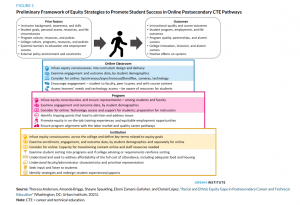Advance CTE’s “Research Round-up” blog series features summaries of relevant research reports and studies to elevate evidence-backed Career Technical Educational (CTE) policies and practices and topics related to college and career readiness. This month’s blog highlights opportunities for state leaders to consider implications for equity in online and hybrid CTE courses. These findings align with Advance CTE’s vision for the future of CTE where each learner accesses high-quality CTE programs without borders.
![]() Data Insights to Improve Racial Equity in Online Postsecondary Career and Technical Education Research and Learning from CTE CoLab, released by Urban Institute’s CTE CoLab, provides insights into racial equity gaps in postsecondary CTE programs, especially those offered partially or fully online. With the continued growth of online learning, this report underscores the importance of understanding how programs can meet student needs, address barriers, and create equitable experiences for students of color. This blog provides definitions of commonly used terms within the report, the methodology of the research, relevant findings for state leaders, and recommendations with targeted action steps by stakeholder groups.
Data Insights to Improve Racial Equity in Online Postsecondary Career and Technical Education Research and Learning from CTE CoLab, released by Urban Institute’s CTE CoLab, provides insights into racial equity gaps in postsecondary CTE programs, especially those offered partially or fully online. With the continued growth of online learning, this report underscores the importance of understanding how programs can meet student needs, address barriers, and create equitable experiences for students of color. This blog provides definitions of commonly used terms within the report, the methodology of the research, relevant findings for state leaders, and recommendations with targeted action steps by stakeholder groups.
Key findings
- Online learning continues to be more popular following the pandemic.
- Hybrid courses (a combination of online and face-to-face) in the CTE CoLab have better learner outcomes overall, relative to fully online or face-to-face courses.
- Learner outcomes measured in this report include the grade learners received in the course, passing rate, and completion rate.
- There are racial equity gaps in CTE student outcomes, nationally and at CTE CoLab colleges.
- Addressing racial equity gaps in postsecondary CTE requires action at various levels:
- Instructors are the first line of support for CTE students.
- Programs can identify opportunities to support students.
- Institutions are the next frontier in addressing racial equity gaps in CTE outcomes.
Research Background & Methodology
CTE CoLab first analyzed available national data and existing literature to establish an understanding of the current racial equity gaps among learners in CTE programs. This data was used to develop a preliminary framework (see below). Twelve community and technical college programs from across the country joined the CTE CoLab’s college community of practice through a competitive selection process. Participating programs shared student academic data with the Urban Institute for calendar years 2021 and 2022 (i.e., spring 2021 through fall 2022) and provided insights on the structural gaps within their programs through an ongoing coaching engagement and targeted interviews.
Feedback from instructor surveys documented faculty characteristics, classroom practices, familiarity and comfort with racial equity concepts, and program challenges related to racial equity. In addition to using the research insights from the Urban Institute to support their racial equity work, many participating programs also conducted their own student surveys and focus groups to better understand student experiences.

Definitions
- Online education is a learning environment in which technology facilitates interactions between teachers and students who are separated by time or space. It ranges from hybrid/blended instructional approaches to fully online courses and programs. In this brief, we treat the terms “online education,” “online learning,” and “distance education” as interchangeable.
- An online course is a course that is taught virtually. Online course-taking can mean completing one fully online course during a semester or participating in a fully online program.
- An online program is a program of study in which all courses are taught virtually.
- Hybrid/blended instructional approaches combine online and face-to-face courses
Key recommendations
Based on the findings, the following recommendations provide targeted action steps organized by stakeholder group. For additional perspectives, refer to page 24 in the report.
- Understand racial equity gaps in student outcomes,
- Instructors and programs:
- Examine course and program data to identify student characteristics and differences in outcomes by race and other factors.
- Understand more about where and why gaps exist by collecting qualitative insights from students through prompts/assignments, interviews, focus groups, surveys, and/or feedback forms.
- Use data insights to inform course design to improve course outcomes. They can seek to improve their own knowledge of resources and supports that may be valuable to students and share these insights with others.
- Design policies, practices, and supports around student needs and desires, with the goal of reducing inequities in entry, retention, and completion.
- Institutions:
- Identify ways to increase institutional research capacity and provide training for program leaders and instructors on data collection and usage. Institutional research offices can work with individual programs or instructors to monitor student progress and success in real-time or improve data tools easily accessed by faculty, staff, and administrators.
- Review student data across programs to see where racial opportunity gaps are most severe.
- Conduct surveys, focus groups, or feedback forums to understand how to respond to students’ needs across program areas.
- Instructors and programs:
- Design courses for equity,
- Instructors and programs:
- Modify syllabi and curricula to be more culturally responsive.
- Institutions:
- Support faculty by offering equity-centered professional development, and professional development instruction on digital tools for faculty may also be beneficial. Leverage stipends to encourage participation and ensure all faculty members are able to participate.
- Set a standard for language, concepts, and terminology related to racial equity.
- Instructors and programs:
- Support equity consciousness at a broader system level, and
- State policymakers:
- Make disaggregated education, employment, and earnings data available to programs, institutions, and state stakeholders to track long-term student outcomes.
- Other system stakeholders:
- Review accreditation, licensing, and funding procedures that limit colleges’ flexibility to respond to student, instructor, and program needs. Flexibility has emerged as one of the most important elements of promoting student success.
- Review accreditation, licensing, and funding procedures that limit colleges’ flexibility to respond to student, instructor, and program needs. Flexibility has emerged as one of the most important elements of promoting student success.
- State policymakers:
- Conduct further research on effective approaches.
- Institutions and funders:
- Support research to identify high-impact strategies for hybrid courses and whether certain elements of CTE programming are better delivered through hybrid learning than fully remote learning, focusing on benefits for different types of learners.
- Institutions and funders:
To learn more about resources and strategies to increase equitable access for every CTE learner, visit Advance CTE’s Learning that Works Resource Center.
- Achieving Inclusive CTE Goal-Setting Tool: This goal-setting tool adds a new resource in the data toolbox for state and local CTE and career pathways leaders to assess learner group data in comparison to the broader student population. With this goal-setting tool, leaders can more intentionally plan to recruit, engage, and support underrepresented learner groups to increase access to high-quality CTE programs and career pathways.
- CTE Without Borders Policy Playbook:This resource, developed in partnership with the Southern Regional Education Board and the Western Interstate Commission for Higher Education, supports state and local leaders in the development of policies and programs that advance the expansion of CTE and work-based learning within and across states.
- Learner Voice Toolkit: This toolkit provides state and local CTE leaders with actionable resources, guidance and tools to ensure CTE learner voices are elevated and heard for the improvement of CTE policies and practices.
Amy Hodge, Member and Policy Associate


 Distance learning breaks down geographical barriers, enabling students from remote or underserved areas to access high-quality CTE programs. By offering online courses, CTE programs can reach a broader audience of learners, including those who may face obstacles in attending traditional in-person classes. This increased accessibility can result in a more diverse and inclusive CTE learner population. The fifth principle of
Distance learning breaks down geographical barriers, enabling students from remote or underserved areas to access high-quality CTE programs. By offering online courses, CTE programs can reach a broader audience of learners, including those who may face obstacles in attending traditional in-person classes. This increased accessibility can result in a more diverse and inclusive CTE learner population. The fifth principle of 
 In March 2021, Advance CTE released
In March 2021, Advance CTE released